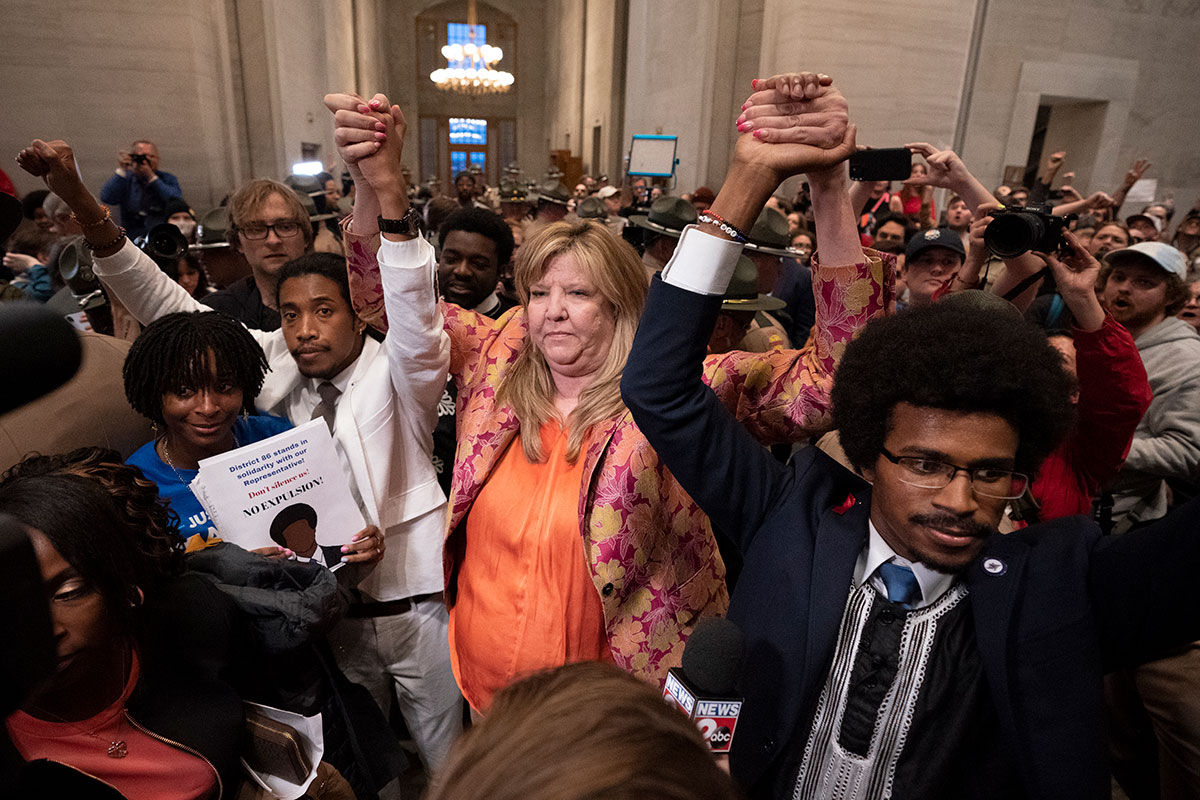In the April 23, 2023, issue of the Atlantic, Ron Brownstein summarized how the removal of two young Black millennial lawmakers, Reps. Justin Jones and Justin Pearson, is part of a nationwide trend in deep-red states. Jones and Pearson represent constituents in the Democratic-leaning cities of Nashville and Memphis, respectively.
The move, as ill-conceived in Tennessee as it was, harkens back to the extreme racism and frequent torture of Black bodies, including many young Black men, during the Freedom Rides of the early 1960s.
Brownstein writes: “The vote in the Tennessee House of Representatives … marked a new level in the long-term struggle between red states and blue cities. In most red states, Republicans control the governorship and/or state legislature primarily through their dominance of predominantly white non-urban areas. Over the past decade, those red-state Republicans have grown more aggressive about using that statewide power to preempt the authority of, and override decisions by, their largest cities and counties, which are typically more racially diverse and Democratic-leaning.”
How should readers of the Mississippi Free Press view the repugnant actions of the Tennessee House of Representatives on April 7 to oust, or in their language ‘“expel,” two Black men from their ranks? A good place to start is with how Jones and Pearson, channeling Dr. Martin Luther King and Malcolm X, characterized this outrageous stunt.
Strong, Black Voices v. Tennessee Republican House Majority
Jones and Pearson called their expulsions “silencing” because their strong, loud voices in the well of the chamber during a lunch break apparently threatened the speaker of the House of Representatives. The speaker puzzlingly invoked a never-used protocol that “protests” should not occur during the conduct of the state House of Representatives. However, house business was not actually occurring at the time the men stood at the well—and let’s not forget that Rep. Gloria Johnson told CNN she was spared “because I’m a white woman.”
Understandably, these Black legislators and their white allies merely wanted their colleagues in the House to seriously consider passing common sense gun laws after the horrific slaughter of children and teachers at Covenant School, a religious school in Nashville, Tenn. The victims included three grade-school children who were only 9 years old and three adult educators.
| On April 11, 2023, Tennessee Rep. Gloria Johnson joined CNN This Morning to discuss the expulsion of Democratic Reps. Justin Jones and Justin Pearson on April 6, 2023. Nashville’s governing council voted to reinstate Jones on April 10, 2023, and Memphis reappointed Pearson to the body on April 12, 2023. Video courtesy CNN/YouTube |
Silencing dissidents provokes powerful emotional images among Black, Brown and Indigenous people, but the draconian measures did more than just muzzle their voices. With the implementation of the 1790 Naturalization Act, white (Irish) immigrants in the late 19th century enjoyed readier and faster rights of citizenship in the U.S. than free Black people and rural whites who were too poor to purchase property. Recall that Black Americans, despite their status as “free people of color” after the Civil War and the adoption of the 13th Amendment, routinely faced lynching.
Some were dumped along the Mississippi River (including near Natchez where I used to live) while “chained to old jeep engines” and “attached to old train rails and flywheels.” A Canadian Broadcasting Company documentary chronicled the bodies of Charles Moore and Henry Dee of Meadville, accelerated into a liminal state as “no-bodies,” meaning they became corpses in the river while still alive, like the matriarch in Faulkner’s “As I Lay Dying.”
The entire scene stirred my recollection of an episode when the Immigration and Naturalization Service officer in New Orleans paused my naturalization application because, in my interview, I acknowledged that there were aspects of socialism I considered good public policy and a right of humanity like Medicare. Today, we seem to be back to immigrants being denied asylum due to their branding as “illegals.”
The Kafkaesque ouster of Jones and Pearson, as well as the near-miss riddance of Johnson (who survived by a single vote), effectively “cancels” their rights as political citizens to represent the interests of the voters in their mostly minority districts. The Tennessee Supreme Court’s approval of extreme gerrymandering in the state, which the radical right fueled, allowed the Republican-dominated House of Representatives to usher in the dismissal of Jones and Pearson like an EF-5 tornado.
On the April 7 edition of The Last Word, host Lawrence O’Donnell characterized the Catholic grammar-school-like expulsion of Jones and Pearson, two gallant millennials of the new MLK generation, as the “most important event” of that week. I believe this perspective sets the civic tone for the resistance and radical activism that is imperative today.
It’s clear to me that the shenanigans in the Tennessee House, along with stunts by GOP leaders in other states, need much more vigorous resistance than we have seen so far.
This MFP Voices essay does not necessarily represent the views of the Mississippi Journalism and Education Group, the Mississippi Free Press, its staff or board members. To submit an opinion for the MFP Voices section, send up to 1,200 words and sources fact-checking the included information to azia@mississippifreepress.org. We welcome a wide variety of viewpoints.






